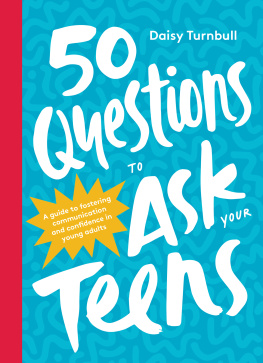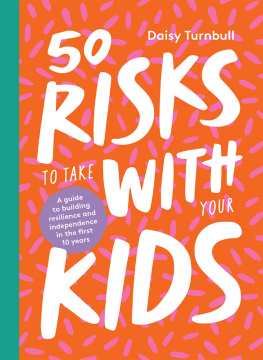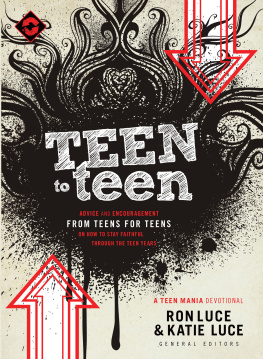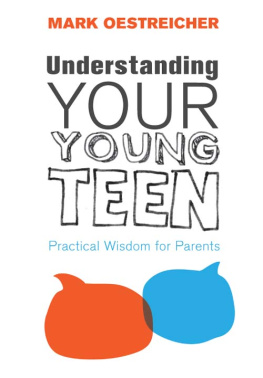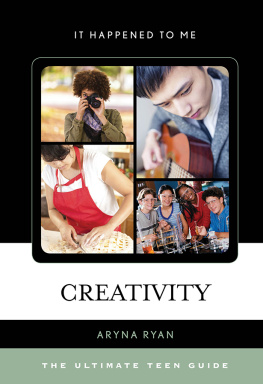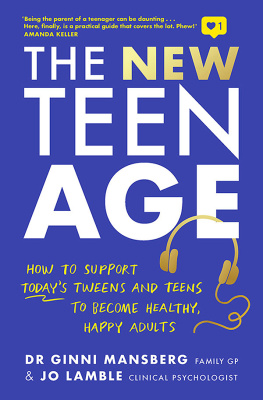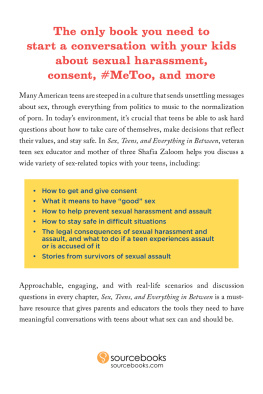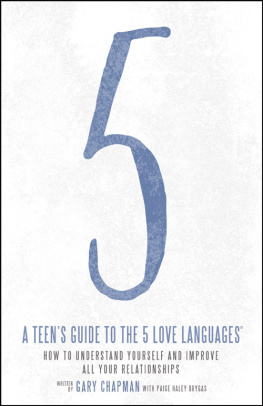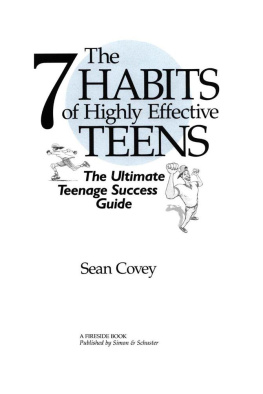
TO LUCY AND MALCOLM, WHO SURVIVED
MY TEENAGE YEARS. THANK YOU, I LOVE YOU.
AND THANK YOU TO THE TEENAGERS WHO HAVE TAUGHT
ME FAR MORE THAN ANY CURRICULUM COULD.
Contents
Because your question searches for deep meaning, I shall explain in simple words.
DANTE ALIGHIERI

Its so important for parents to engage with teenagers by asking questions rather than just making rules and issuing directions. This book starts with that key perspective. It asks those serious questions that are on young peoples minds, about things like sex, consent, feelings, peer and intimate relationships, and wider responsibilities. As a parent, aunt, uncle or close friend, you dont need to know the answers just be willing to join the conversation!
As adolescent thinking moves from the simply transactional to more complex personal and societal considerations, engagement with genuinely inquisitive adults can provide one of the richest environments for promoting development. Adolescent brains thrive on challenges, activities, language and novelty.
Contrary to much popular thinking, teenagers greatly enjoy talking through tough issues with those who have genuine experience. Leaving 15-year-olds to answer the challenges put by other 15-year-olds often doesnt lead to much progress. By contrast, spirited interactions with warm and engaged adults is often the best way forward.
This book doesnt back off from the hard questions. It provides a no-nonsense guide. It addresses the issues that every teenager needs to face at some time. With the assistance of those who really care, that journey can be so much easier. It can also be fun, for both teenagers and their parents. We all need to take the time to grow together. I hope that this book will stimulate many others to take that time.
PROFESSOR IAN HICKIE
AM MD FRANZCP FASSA FAHM FRSN
CO-DIRECTOR, HEALTH AND POLICY,
BRAIN AND MIND CENTRE, THE UNIVERSITY OF SYDNEY
ASSOCIATE PROFESSOR ELIZABETH SCOTT
DMEDSC FRANZCP
PRINCIPAL RESEARCH FELLOW, BRAIN AND MIND
CENTRE, AND CONSULTANT PSYCHIATRIST
Having been a secondary teacher for over 10 years, I have been asked some wonderful, and incredibly difficult, questions by teenagers and their parents. Teenagers are, by definition, a work in progress. There is something fascinating about their constant back and forth, the pulling away and coming back to the nest, the testing of boundaries, the desire for independence while also demanding psychological safety. One of the key things I have learned in teaching teenagers is that experiences are hugely important to them. Experiences literally shape their brains, their characters, their hearts and their relationships.
Often the students with behaviour issues have parents who step in way too much or not at all, sometimes to the point of neglect. In general, teenagers whose parents give them more responsibility are more responsible. Teenagers with a lot of co-curricular commitments might do them because their parents want them to, but theyll only excel in them when they are intrinsically motivated. Parents who focus on strengths have better relationships with their kids. It is important to note here that this book is written for teenagers who are neurotypical, although I do include some information about neurodivergent teens. Where my first book, 50 Risks to Take With Your Kids, was written for the overparenter (which is most of us), this is written for the parents of your average teenager who is not really average at all.
Without getting too deep into the technicalities, you become a teenager at 13 years of age, and an adult at 20. But for the purposes of this book, Im going to think of teenagers as actually starting at 11 or 12, given that a lot of students starting high school are only 12.
50 Risks mentions my kids Jack and Alice quite a bit, because when I wrote it they were three and six and I drew on my lived experience as a mother. This book does not include much of Jack and Alice, because they are not yet teenagers (unless I go seriously over deadline), but it reflects my lived experience as a high-school teacher. (Note: student experiences featured within these pages are anonymised.)
Where 50 Risks to Take With Your Kids focused on the practical, underpinned by psychological evidence, 50 Questions to Ask Your Teens goes beyond the practical. For all my jokes about making teenagers sit on hold to a utilities company for hours on end (and they should definitely do that at some point), there are far greater complexities to teenage life, and to parenting a teenager, than that.
What do you want your relationship with your kids to be like when they are grown up? And how do you intend to get there?
I volunteer at Lifeline, a 24-hour telephone crisis support service in Australia. Many of the calls I take there distress me, but the ones that I really need a self-care break after are from women in their 60s and 70s who are lonely because their kids never visit or call them. I want to say, Call your kids and tell them youve been calling Lifeline. That will make them realise how crap they are being. But of course I cant do that, and in many cases there are reasons for distance.
But how do those parents get to that point, and how do you (and I) not?
The teen years are crucial to this.
This book is being written in what I pray to God is the tail end of a pandemic in Australia. There are two concepts that have bubbled along throughout the COVID-19 pandemic. The first is the impact toxic stress has on children and teenagers, even once life goes back to normal, whatever that looks like. The second is the importance of relationships and connection.
Many relationships were strained during the pandemic, which is why these two topics are so interconnected. The external stress of the pandemic, lockdown, working and studying from home, and all that screen time (and associated screentime guilt) affected everyone, but especially teenagers.
The risks of social isolation are real; the loneliness of social isolation can lead to mental-health issues, such as depression. Research has shown that much of this social anxiety has stemmed from not having access to the opportunities for empathy and socialisation that teenagers need in order to properly individuate from their parents.
But toxic stress and external impacts on family life are not new. Wars, famines and nuclear disasters have impacted generations of children long before ours. Those experiences, just like this one, have all shown that whats important is how family relationships shape and protect childrens development through these storms.
I write with hope for the future. I write with hope that the teenagers today, the ones I teach, especially, will make the world better, and safer, and far, far kinder than it is now. We dont know what the mid- to long-term impacts of this pandemic will be on teenagers, but I hope that it has taught us all the importance of protecting our mental health through relationships, connection and conversation.


